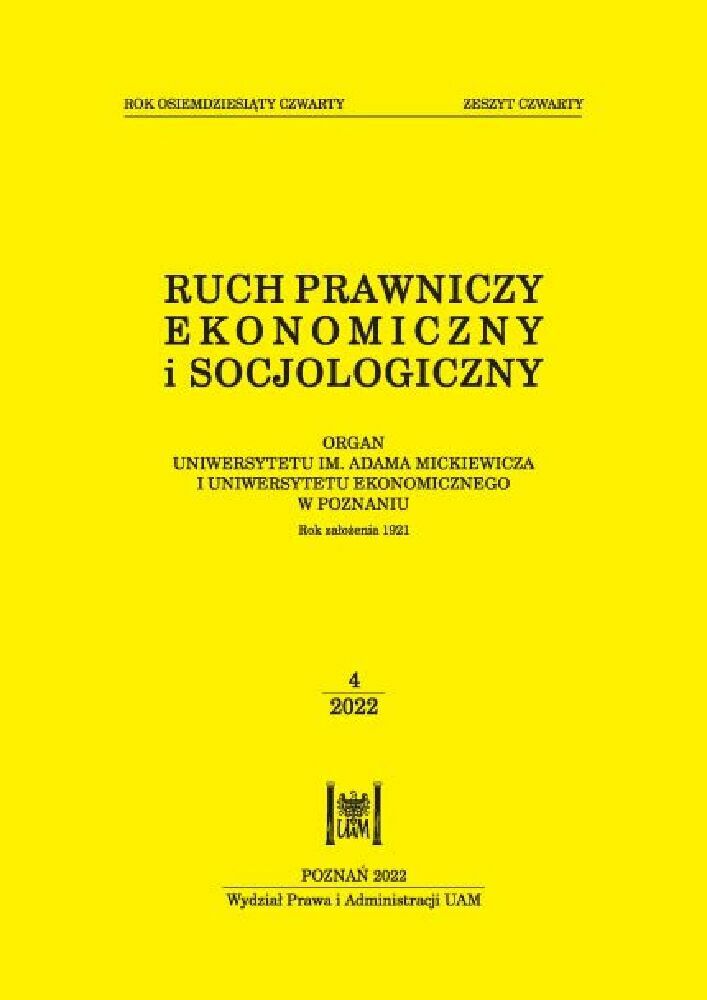Abstrakt
W artykule poszukuję odpowiedzi na pytanie, czy Durkheimowski utylitaryzm, zrekonstruowany na bazie koncepcji Jonathana Haidta, może stanowić uzasadnienie egzekwowania moralności za pomocą prawa karnego (tzn. czy jest adekwatną teorią moralizmu prawa). W pierwszej części przedstawiam, czym Durkheimowski utylitaryzm jest i jakie głosi tezy, w drugiej zaś, korzystając z klucza interpretacyjnego Herberta Harta wykorzystanego w polemice z Patrickiem Devlinem, wyjaśniam, jakiego stanowiska moralistycznego teoria ta rzeczywiście broni. Ostatecznie dochodzę do wniosku, że główną tezą Durkheimowskiego utylitaryzmu jest Hartowska teza o dezintegracji. Brak odpowiedniego uzasadnienia empirycznego rodzi jednak wątpliwość, czy może on stanowić satysfakcjonującą teorię moralnego uzasadnienia kryminalizacji.
Finansowanie
Narodowe Centrum Nauki
Bibliografia
Bassham, G. (2012). Legislating morality: scoring the Hart-Devlin debate after fifty years. Ratio Juris 25(2): 117-132. https://doi.org/10.1111/j.1467-9337.2012.00506.x DOI: https://doi.org/10.1111/j.1467-9337.2012.00506.x
Cane, P. (2006). Taking law seriously: starting points of the Hart/Devlin debate. The Journal of Ethics 10(1/2): 21-51. https://doi.org/10.1007/s10892-005-4590-x DOI: https://doi.org/10.1007/s10892-005-4590-x
Devlin, P. (1965). The Enforcement of Morals. Oxford: Oxford University Press.
Duff, R.A. (2014). Towards a modest legal moralism. Criminal Law and Philosophy 8(1): 217-235https://doi.org/10.1007/s11572-012-9191-8 DOI: https://doi.org/10.1007/s11572-012-9191-8
Dworkin, R. (1966). Lord Devlin and the enforcement of morals. The Yale Law Journal 75(6): 986-1005. https://doi.org/10.2307/794893 DOI: https://doi.org/10.2307/794893
Feinberg, J. (1990). Harmless Wrongdoing. Vol. 4. Oxford: Oxford University Press.
Fletcher, G. (2013). A fresh start for the objective-list theory of well-being. Utilitas 25(2): 206-220. https://doi.org/10.1017/S0953820812000453 DOI: https://doi.org/10.1017/S0953820812000453
George, R.P. (1995). Making Men Moral: Civil Liberties and Public Morality. Oxford: Clarendon Press. https://doi.org/10.1093/acprof:oso/9780198260240.001.0001 DOI: https://doi.org/10.1093/acprof:oso/9780198260240.001.0001
Glanc-Żabiełowicz, M. (2021). Debata Hart-Devlin. Studium z filozofii prawa. Gdańsk: Wydawnictwo Uniwersytetu Gdańskiego.
Graham, J., Haidt, J., Koleva, S., Motyl, M., Iyer, R., Wojcik, S.P., Ditto, P.H. (2013). Moral foundations theory: the pragmatic validity of moral pluralism, [w:] P. Devine, A. Plant (eds.), Advances in Experimental Social Psychology (55-130). Vol. 47. San Diego: Academic Press. https://doi.org/10.1016/B978-0-12-407236-7.00002-4 DOI: https://doi.org/10.1016/B978-0-12-407236-7.00002-4
Haidt, J. (2013). Prawy umysł. Dlaczego dobrych ludzi dzieli religia i polityka. Tłum. A. Nowak-Młynikowska. Sopot: Smak Słowa.
Haidt, J. (2014). Why I think Sam Harris is wrong about morality. [Online]: <https://righteousmind.com/why-i-think-sam-harris-is-wrong-about-morality> [dostęp: 30.12.2021].
Haidt, J., Graham, J. (2009). Planet of the Durkheimians, where community, authority, and sacredness are foundations of morality. [w:] J.T. Jost, A.C. Kay, H. Thorisdottir (eds.), Social and Psychological Bases of Ideology and System Justification (371-401). Oxford: Oxford University Press. https://doi.org/10.1093/acprof:oso/9780195320916.003.015 DOI: https://doi.org/10.1093/acprof:oso/9780195320916.003.015
Harris, S. (2012). Pejzaż moralny. W jaki sposób nauka może określać wartości. Tłum. P. Szwajcer. Warszawa: Wydawnictwo Stare Groszki.
Hart, H.L. (1967). Social solidarity and the enforcement of morality. The University of Chicago Law Review 35(1): 1-13. https://doi.org/10.2307/1598946 DOI: https://doi.org/10.2307/1598946
Hart, H.L.A. (1963). Law, Liberty, and Morality. Stanford: Stanford University Press. https://doi.org/10.1515/9781503620612 DOI: https://doi.org/10.1515/9781503620612
Hart, H.L.A. (1968). Punishment and Responsibility: Essays in the Philosophy of Law. Oxford: Oxford University Press.
Hart, H.L.A. (1983). Essays in Jurisprudence and Philosophy. Oxford: Oxford University Press. https://doi.org/10.1093/acprof:oso/9780198253884.001.0001 DOI: https://doi.org/10.1093/acprof:oso/9780198253884.001.0001
Hooker, B. (2002). Ideal Code, Real World: A Rule-Consequentialist Theory of Morality. Oxford: Oxford University Press. https://doi.org/10.1093/0199256578.001.0001 DOI: https://doi.org/10.1093/0199256578.001.0001
Hurka, T. (1996). Perfectionism. Oxford: Oxford University Press. https://doi.org/10.1093/0195101162.001.0001 DOI: https://doi.org/10.1093/0195101162.001.0001
Juzaszek, M. (2022). Haidt's Durkheimian Utilitarianism - a Charitable Interpretation. Philosophia. <https://link.springer.com/article/10.1007/s11406-022-00570-4> [dostęp: 20.12.2022]. https://doi.org/10.1007/s11406-022-00570-4 DOI: https://doi.org/10.1007/s11406-022-00570-4
Juzaszek, M. (2023). Durkheimian utilitarianism and legal moralism. Revus 49. <https://journals.openedition.org/revus/8652> [dostęp: 20.12.2022]. https://doi.org/10.4000/revus.8652 DOI: https://doi.org/10.4000/revus.8652
Kekes, J. (1998). A Case for Conservatism. Ithaca: Cornell University Press.
Kekes, J. (2000). The enforcement of morality. American Philosophical Quarterly 37(1): 23-35.
Kluver, J., Frazier, R., Haidt, J. (2014). Behavioral ethics for Homo economicus, Homo heuristicus, and Homo duplex. Organizational Behavior and Human Decision Processes 123(2): 150-158. https://doi.org/10.1016/j.obhdp.2013.12.004 DOI: https://doi.org/10.1016/j.obhdp.2013.12.004
Lukes, S., Prabhat, D. (2012). Durkheim on law and morality: the disintegration thesis. Journal of Classical Sociology 12(3/4): 363-383. https://doi.org/10.1177/1468795X12453270 DOI: https://doi.org/10.1177/1468795X12453270
Mitchell, B. (1967). Law, Morality and Religion in a Secular Society. Oxford: Oxford University Press.
Moore, M.S. (2010). Placing Blame: A Theory of the Criminal Law. New York: Oxford University Press. https://doi.org/10.1093/acprof:oso/9780199599493.001.0001 DOI: https://doi.org/10.1093/acprof:oso/9780199599493.001.0001
Rice, C.M. (2013). Defending the objective list theory of well-being. Ratio 26(2): 196-211. https://doi.org/10.1111/rati.12007 DOI: https://doi.org/10.1111/rati.12007
Ripstein, A. (2007). Legal moralism and the harm principle: a rejoinder. Philosophy & Public Affairs 35(2): 195-201. https://doi.org/10.1111/j.1088-4963.2007.00107.x DOI: https://doi.org/10.1111/j.1088-4963.2007.00107.x
Saja, K. (2015). Etyka normatywna. Między konsekwencjalizmem a deontologią. Kraków: Universitas.
Saja, K. (2019a). The Functional Model of Analysis as Middle Ground Meta-Ethics. Diametros 17(63): 69-89. https://doi.org/10.33392/diam.1296 DOI: https://doi.org/10.33392/diam.1296
Saja, K. (2019b). Institutional function consequentialism. Analiza i Egzystencja 48: 5-25. https://doi.org/10.18276/aie.2019.48-01 DOI: https://doi.org/10.18276/aie.2019.48-01
Sinnott-Armstrong, W. (2021). Consequentialism, [w:] E.N. Zalta (ed.), The Stanford Encyclopedia of Philosophy (Fall 2021 Edition). <https://plato.stanford.edu/archives/fall2021/entries/consequentialism/> [dostęp: 20.12.2022].
Van der Burg, W. (1999). Two models of law and morality. Associations: Journal for Social and Legal Theory 3(1): 61-82.
Wallin, A.E. (2012). John Finnis's natural law theory and a critique of the incommensurable nature of basic goods. Campbell Law Review 35(1): 59-81.
Wolfenden Report (1957). Report of the Committee on Homosexual Offences and Prostitution.
Licencja
Prawa autorskie (c) 2022 WPiA UAM

Utwór dostępny jest na licencji Creative Commons Uznanie autorstwa – Użycie niekomercyjne – Bez utworów zależnych 4.0 Międzynarodowe.





